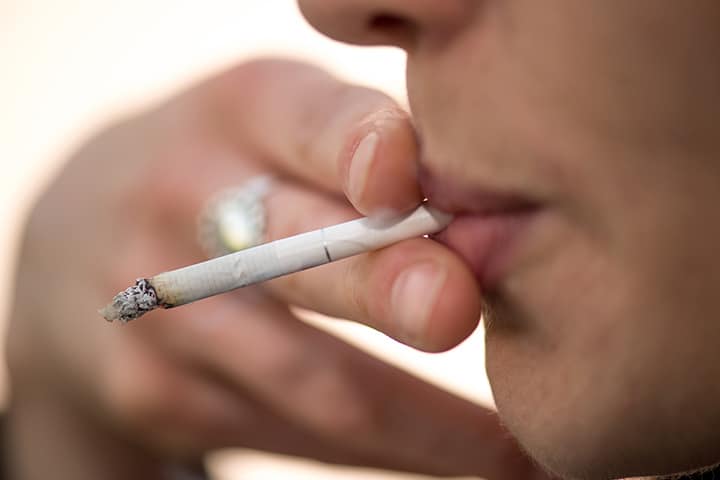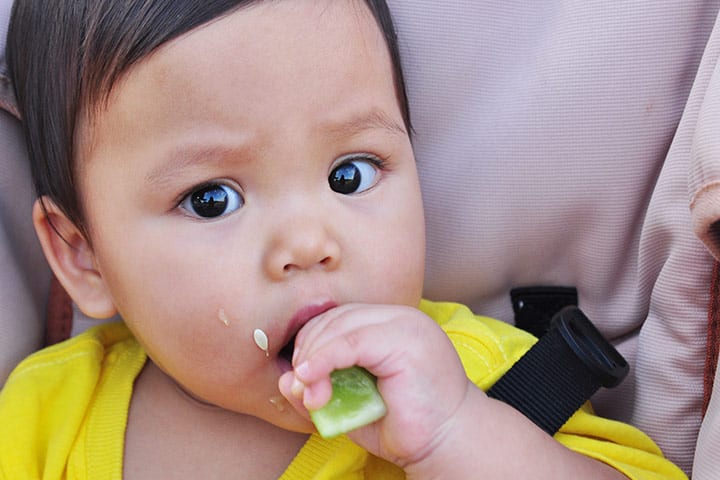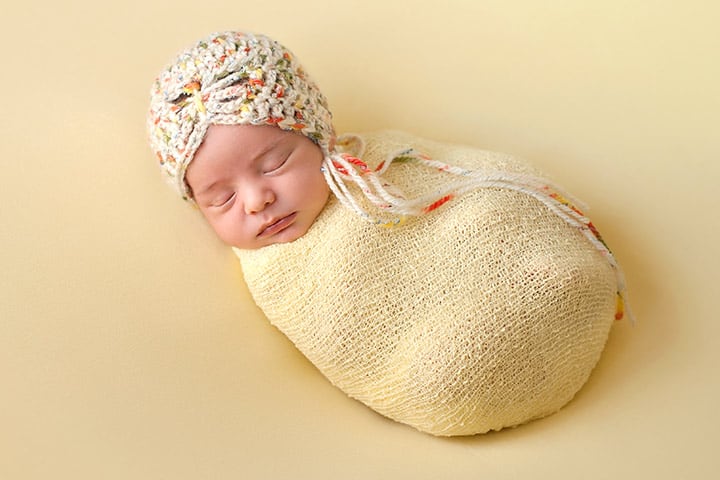The use of marijuana is something that is debatable. Studies often conflict, and assumptions have to be based on single cases, rather than controlled observations. And while some studies state that marijuana has its health benefits, many others don’t conform to the view. But, it is obvious that marijuana use, while you are nursing your little one, is unsafe.
Here, we talk about any potential side effects of smoking marijuana while breastfeeding. So, read on to know more.
Marijuana:
Marijuana is a more popular name given to cannabis. It is prepared from the Cannabis plant and is used as a psychoactive drug, and in some cases, as a medication. The most active ingredient in marijuana, which acts as the psychoactive substance, is known as tetrahydrocannabinol, or THC. Marijuana features on the list of Drugs of Abuse, and the American Academy of Pediatrics (AAP) reports many side effects (1). And Marijuana is unsafe during breastfeeding. Experts, including the American Academy of Pediatrics and American College of Obstetrics and Gynecologists, advise nursing mothers to avoid using marijuana. Apart from the direct effects of chemicals of the drug on a baby, it may impact your ability to care for your child properly. Moreover, it may impair maternal judgment (2).
Effects Of Marijuana On Breast Milk:
There have been few studies on the effects of marijuana on breastfeeding women, and the effects of postnatal marijuana exposure through breastfeeding remain unclear. Delta 9 TetraHydroCannabi, or THC, is the active component of this drug (3). Marijuana’s active chemicals, including THC, enter the breast milk in small to moderate amounts. THC gets stored in the fat tissues for long periods and with continuous use, gets built up in the body.
When you smoke or eat marijuana, the active chemicals in marijuana can pass into your baby’s body through your breast milk. Research has found traces of THC in the urine of babies that are breastfed while their mothers use marijuana.
According to animal studies, cannabis may impede breast milk production (4). It may impact the quality and quantity of breast milk. Animal studies suggest that the drug can inhibit lactation by inhibiting prolactin production. Prolactin that affects production of breastmilk, and possibly, by acting directly on the mammary glands.
Dangers Of Marijuana During Lactation:
An analysis of a chronic marijuana user’s breastmilk indicates an eightfold milk concentration than the mother’s blood plasma. According to studies, there is significant metabolism and absorption in infants (5). However, no long-term marijuana effects on breastfeeding were documented. The use of marijuana during breastfeeding has many risks. Exposing babies to secondhand smoke increases the amount of marijuana that they receive. Also, street drugs are rarely pure, meaning that they may be laced with other unknown drugs or substances that can be extremely harmful to breastfeeding babies.
During the first few months of a baby’s life, his brain grows and develops significantly. Marijuana is dangerous as it may alter brain cells. Studies conducted on animals whose mothers’ milk contains THC showed that the drug may alter DNA and RDA synthesis and impair the proteins required for proper growth and development of brain cells.
Marijuana can cause sleepiness in babies, which can result in slow weight gain. It is also possible that babies’ overall development can be slowed down long term. Additionally, it is important to note that babies regularly exposed to marijuana, as well as other drugs, are at a higher risk of SIDS (6).
A high concentration of THC in breast milk can expose babies to it, and they may experience THC excretion in their urine for 2 to 3 weeks. As mentioned earlier, marijuana can cause sedation and growth delay in infants. According to studies, signs of poor sucking, reduced muscular tonus and sedation have been found in babies exposed to the drug through breast milk (7).
Studies Related To Breastfeeding And Marijuana Use:
The effects of marijuana use by lactating mothers on their baby’s development were evaluated in two studies. In one, there were no significant differences found in terms of growth, weaning or motor and mental development with regard to age.
A 1990 study by Astley and Little, concluded that there is an association between marijuana exposure through breast milk during the first month postpartum and a decrease in infant motor development at the age of one (8). Infants exposed to the drug for over half of the days during the first month of lactation or the first trimester of gestation were found to have significantly lower mean Psychomotor Development Index scores compared to infants who were not exposed to marijuana.
A correlation between exposure to cannabis during the third month after birth and motor development was not found in the study. There was also no connection between exposure during the first and third-month post partum and an infant’s mental development (9). However, it should be noted that it is still a preliminary study and the cause-effect relation between exposure to marijuana during lactation and motor development decrease in an infant is not necessarily direct and simple. There are other factors involved such as exposure to the drug during pregnancy, passive cannabis smoke exposure and the quality of the relationship between mother and child. At present, there are no studies related to the long term effects of marijuana exposure through breastfeeding.
As mentioned earlier, there is limited published data on the effects of marijuana on a baby through breast milk. Data often comes from random screenings of breast milk and not from controlled studies (10). The ethical considerations in administering marijuana to breastfeeding mothers have limited controlled studies. There has been a lot of concern regarding the drug’s possible effects on the development of the nervous system, endocannabinoid-related functions, such as emotional learning and anxiety regulation, and neurotransmitters.
Effects Of Tobacco:
When marijuana is smoked, it is often mixed with tobacco. The effects of tobacco on infants exposed marijuana through breast milk need to be considered as well. A study was conducted to investigate the effects of exposure to smoke through mothers’ milk or passive smoking during a child’s first year (11). At birth, the mean body weight of newborns with mothers who smoke was significantly lower than the weight of newborns with non-smoking mothers. It was also found that cotinine concentrations in breastfed babies were ten times higher than bottle-fed babies.
Sudden Infant Death Syndrome:
Mothers need to be informed about the risk of SIDS, or Sudden Infant Death Syndrome, which is associated with maternal smoking during pregnancy and after birth. The ratio of normal birth-weight babies for SIDS was approximately 2 for exposure only during infancy (passive exposure) and increased to 3 for exposure during pregnancy and infancy (combined exposure). These numbers suggest that both passive and intrauterine exposure to tobacco is associated with a higher risk of SIDS (12). The data is further incentive to encourage pregnant women and families with children to stop smoking.
However, another study on whether the risk of SIDS increased during the first year of an infant’s life with paternal or maternal drug use during conception and pregnancy and after birth. According to the results, there was no link between SIDS and maternal drug use. But it was found that there is a significant relation between paternal use of marijuana during conception, pregnancy and postnatally and SIDS.
Side Effects Of Smoking Marijuana While Nursing:
More research is required to determine the effects of marijuana on breast milk, but studies have indicated some areas that contain risk factors including the following:
1. Hyperactivity:
According to some studies, exposing breast milk to marijuana can result in hyperactivity. There is a significant risk of ADHD, or Attention Deficit Hyperactivity Disorder (13). However, other studies show that it reduces activity, or does not have any effect on babies.
2. Mental Functions:
Breast milk that is exposed to marijuana can affect working memory, flexibility in thinking and attention spans. Working memory manages and stores the information that is used to carry out complex mental tasks such as learning, reasoning and understanding (14). Mothers who use marijuana while they breastfeed can increase the risk of brain and nervous system development impairment.
3. Changes In Emotional Reactivity:
Marijuana exposure to breast milk can cause changes in children’s emotional reactivity (15). Emotional reactivity is a child’s tendency to experience intense and frequent emotional arousal. It also means how often emotional arousal occurs and how easily the child can get excited.
4. Risk Of Future Drug Abuse:
According to animal studies, early marijuana exposure increases the reinforcing effects of drugs. Although more marijuana and breastfeeding research and studies are required to confirm the reinforcing effect, it has been proven that drug use and abuse is influenced by genetics and hereditary. If a mother uses marijuana and exposes her baby to the drug through breast milk, it can increase the risk that the child will use marijuana or other substances in the future.
Marijuana Unsafe While Breastfeeding:
It is important for mothers to know that smoking marijuana during breastfeeding, is not safe (16). Yes, long term effects are still not fully known; however, studies so far have shown that the drug can have a negative impact on a baby’s growth and development. As mentioned earlier, THC remains in the body where fat cells are present. Breast milk contains fat, and when marijuana is smoked or eaten by a nursing mother, THC gets concentrated in it. In fact, because it is fat soluble, it can remain in the fat tissue of chronic users for 1 to 6 months (17).
The American Academy of Pediatrics advises mothers against using marijuana. There is a lack of studies, and also, there is no proper regulation of marijuana as a medical drug. This is why there is more concern about its effects on breastfeeding babies than some pharmaceuticals. In fact, in 2013, in its first statement regarding the issue, the AAP noted that breastfeeding mothers can take more prescription medications without putting their babies’ health at risk, but that they should still avoid certain psychiatric drugs, painkillers and herbal treatments (18).
Psychotropic substances, such as marijuana, amphetamines, LSD, heroin and more, enter milk readily and that infants may be at a high risk of apnea, sedation or death if the dose of the drug is high enough. Furthermore, despite the clinical effect, infants will screen positive for a number of days, even weeks, following their use.
In general, regular marijuana use is not considered safe during lactation and pregnancy. However, the Academy of Breastfeeding Medicine (2015) states that it is difficult to make recommendations during lactation as research relating to the effects of marijuana on breast milk and breastfeeding babies.
The advice given to mothers by the American Academy of Pediatrics, Academy of Breastfeeding Medicine (ABM) and Thomas Hale, the author of ‘Medications and Mothers’ Milk’, is similar – to seek help to decrease marijuana use or stop completely and minimize babies’ exposure to the drug (19) .According to experts, the drug should not be considered safe even though there is no scientific evidence to suggest that it causes long-term harm to babies.
Occasional Marijuana Use While Breastfeeding – Is It Safe?
Opinions regarding the safety of occasional marijuana use by lactating mothers vary. When a mother smokes the drug occasionally, the numerous benefits of breastfeeding, which can decrease some side effects, should be weighed against the risks of using formula milk and the risks of using the drug.
According to the AMB, mothers who admit to rare or occasional use of marijuana should be counseled to stop using or reduce marijuana use. They should be advised about the possible long-term neurobehavioral effects and instructed to avoid exposing the child directly to marijuana and its smoke. Hale and other authors recommend not breastfeeding for 24 to 48 hours after using marijuana, i.e. pump the breast milk and discard it (20).
However, according to other breastfeeding experts, there is no need to discard milk after marijuana use. If a mother uses the drug occasionally and can take proper care of her child, there is no reason to use formula as there is no evidence that the presence of small amounts of components will harm the infant.
Does Marijuana Affect Milk Supply Or Hormones?
In one study, it was found that marijuana use could have a significant effect on the reproductive system, including milk production and fertility. It can also influence the mother’s metabolism, mood and sleep patterns by affecting control of hormones. As mentioned earlier, animal studies have shown a decrease in prolactin (the hormone that affects milk production) levels. However, it should be noted that abnormally high prolactin levels, or hyperprolactinemia, have been reported among chronic marijuana users (21).
Although the long term effects of marijuana remain unclear, experts agree that the drug does affect breast milk and babies that are breastfed are at risk of side effects. This is why mothers who use marijuana are advised to not use the drug while they are breastfeeding or completely stop using the drug to minimize any risk of harming their babies.
Although sufficient research or proof regarding marijuana use and its effect on breastfeeding babies is not available, the general advice is that the drug is contraindicated for mothers who are breastfeeding because:
- It will most likely affect a mother’s ability to care for her child
- It passes into the baby’s body through breast milk and smoke
- The drug’s profile can potentially affect the baby’s developing brain and have other negative short term effects
- Street drugs are often mixed with other potentially harmful substances, making marijuana exposure to babies dangerous
- Using other harmful drugs along with Marijuana can increase the risk as well
Using marijuana while breastfeeding is not safe. The lack of evidence does not mean that there are no dangerous long term effects. Even if a mother does not breastfeed, it is best to avoid the drug completely as some studies have shown that babies whose parents smoke cannabis are more likely to develop asthma or suffer from SIDS, which could be a result of breathing secondhand smoke.
In 2015, in a new policy statement by the American Congress of Obstetricians and Gynecologists, pregnant and breastfeeding women are urged to avoid marijuana use (22). Nursing mothers should talk to their health care providers to find ways to reduce their drug use or quit completely. The best thing mothers can do to protect their babies against the potentially harmful effects of the drug is to stop smoking it as well as using other drugs.
How To Reduce Use Of Marijuana?
If you are addicted to marijuana, it can be an uphill task to get over your addiction. But, bear in mind that you are now a soon-to-be mom, and your priority should remain your baby’s health and wellbeing.
Marijuana users who try to stop consuming it all at once, may experience some withdrawal symptoms,which include:
- Insomnia
- Irritability or Restlessness
- Strong craving to resume pot
- Loss of appetite
These symptoms can last for as long as two weeks before showing signs of subsiding. Marijuana addiction treatment can help reduce these withdrawal symptoms. In some cases, the withdrawals are purely psychological and have no physical symptoms.
The most important step and part of treatment, especially for pregnant women is counseling. This is often coupled with non-addictive mild medications that help lessen withdrawal symptoms. Once the mom to be is detoxed, both individual and group sessions are suggested to help her stay sober. These sessions are a combination of hearing out the patient and rendering simple but effective strategies to help prevent a relapse.
Many women are suggested to join local support groups that have regular meet ups.
5 Tips To Cope With Marijuana Addiction:
Overcoming an addiction, such as marijuana is in no terms easy, but you are not alone in the battle. There are many ‘marijuana and addiction’ support groups who take up the cause, and help you at every step.
1. Be Patient:
An addiction in itself is a sign that you suffer from anxiety and have chosen it to help relieve yourself. Once you have made up your mind to give up pot, it is important that you remain patient and not expect results overnight. It is likely that you will feel very anxious for the first week. Keep reminding yourself that this will soon pass. Patience is the key to getting over marijuana.
2. Be Calm:
When you feel very restless, take a long breath and calm yourself. Breathe, take it slow and stay calm, and you will soon feel better again. There are many ways you can maintain your composure. Make yourself a cup of hot herbal tea. A tea of sage or rosemary herb can help ease your nerves.
You can also indulge in a hobby that you never had time for. It can be something as simple as knitting. Sit down to knit a sweater for your child. Yoga too can help you stay calm, especially when you are trying hard to give up marijuana. It will soothe your mind and keep you from reaching out for pot again.
3. Seek Help:
At times, just yoga and herbal teas may not be enough to overcome your anxiety. If you feel particularly uneasy, make sure you seek your doctor’s help. He is likely to give you a mild anti-anxiety medication that will help ease the withdrawal symptoms of the drug.
4. Seek Support:
There are several 12-step programs and groups like Marijuana Anonymous that help you share and discuss your anxiety and other symptoms and fears. If you find it difficult to travel, you can also be a part of the many online support groups, and chat with other people who are trying to overcome the addiction. Knowing you aren’t alone, can be a great boost.
5. Get Active:
The best way to keep the withdrawal symptoms at bay is to become a bit more active. This will help you stay calm and set your mind at ease. Consult your doctor and set aside at least 30 minutes to practice moderate exercises. You will find yourself a lot more relaxed and less anxious. What’s more? It will also help you sleep better as your body will be tired and will ask for rest!
The fact is that drug use, whether it is marijuana or heroin or prescription drugs, impairs judgment, and this could affect how a mother takes care of her baby. It is best for pregnant and breastfeeding mothers to avoid using any drugs so that they are not only able to care for their health and baby, but also prevent any side effects of their drug use from harming their child. The advice of experts should be taken, and marijuana use should be avoided at all costs by mothers who are nursing their babies.
























